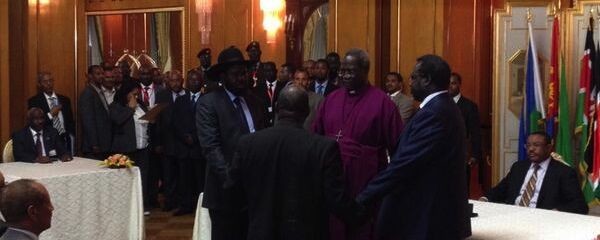(UPDATE 07:30) -The leaders of South Sudan’s government and armed opposition signed late Friday an agreement committing to establish a transitional government and a truce, as armies remained braced for battle near Bentiu and Nasser towns.
The Agreement contains a commitment to an immediate Cessation of Hostilities within 24 hours of the signing. It commits both sides to freeze forces in their current locations and “refrain from any provocative action or combat movement until a permanent ceasefire is agreed,” the IGAD mediators announced.
The South Sudanese leaders have further committed to unconditionally cooperate with the IGAD Monitoring and Verification Mechanism (MVM) as well as to facilitate unhindered humanitarian access throughout the country.
In addition, they agreed to work together to move the country forward by establishing a transitional government of national unity through “an all inclusive peace process” involving the government, opposition, SPLM ‘former detainees,’ other political parties, civil society and faith-based leaders.
IGAD says the proposed transitional government will be tasked to “implement critical reforms as negotiated through the peace process” and oversee a permanent constitutional process while guiding the country toward new elections.
The terms of the transitional government will be negotiated through the IGAD-led peace process. The two leaders will also be holding a follow up meeting in one month under the auspices of IGAD.
“It’s with a sense of relief and guarded optimism that I announce a breakthrough in the South Sudan peace process,” said Ethiopian Prime Minister Hailemariam Desalegn, as quoted by the IGAD regional organization that he chairs.
Likewise, US Secretary of State John Kerry, who three days before announced targeted economic sanctions against Salva Kiir’s top guard commander and Riek Machar’s top general, called the deal today a “breakthrough.”
Kerry, who had dispatched his counselor Tom Shannon to participate in the South Sudan negotiations, cautioned, however, that “hard work will be required to go from here.”
Local reports suggest that Kiir’s army SPLA amassed near Bentiu town on the day prior to the deal. The army on Sunday had launched two offensives, one to take Nasser in eastern Upper Nile and the other to recapture Bentiu.
SPLA gains in Bentiu early in the week were reversed by rebel counter-attacks. In the afternoon on Thursday, SPLA and allied forces advanced again into Bentiu. Although there were some reports of gunfire and artillery, there are also indications that the rebels did not return fire.
By Friday morning, as Machar and Kiir prepared to meet in Addis Ababa, it appeared that SPLA had taken control over Rubkona, Bentiu’s twin city north of the Bahr al Ghazal river, and had also entered once again the deserted parts of Bentiu south of the river.
The SPLA claimed their advance came in response to a rebel attack, but UN sources said they did not notice any action from the side of the opposition forces before SPLA and the allied JEM militia moved against the town.
Kiir-Machar agreement
The proposed text was pushed by Prime Minister Hailemariam Desalegn, who met separately with the two South Sudanese leaders, President Salva Kiir and Riek Machar.
A source close to the talks told Radio Tamazuj on Friday evening before the signing ceremony that the Ethiopian prime minister attempted to bridge the gap between the two sides by presenting them each separately with the document to be reviewed, and requesting an immediate response, ahead of the first face-to-face meeting between Machar and Kiir.
The document was then signed and celebrated in the late evening on Friday. Kiir, who made remarks at the signing, is quoted as saying, “Now that we have come to our senses … dialogue is the only answer to whatever problem we had. We will continue to move in the right direction.”
The national army (SPLA) last January and February breached the first cessation of hostilities agreement, launching major offensives in Unity state, as did the opposition forces elsewhere.
IGAD, the Inter-Governmental Authority on Development, has blamed both Kiir’s and Machar’s forces for ‘flagrant’ violations of the earlier cessation of hostilities agreement.
More recently, fighting on three fronts followed immediately after the visit by US Secretary of State John Kerry last Friday, 2 May, in spite of announcements by Kerry that Kiir intended to commit to the ceasefire and to political dialogue with his rival.
BBC photo: President Salva Kiir joins hands with Archbishop Daniel Deng Bol and Riek Machar, as Ethiopian Prime Minister Hailemariam Desalegn (right) looks on.




